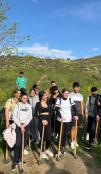EU ANNUAL REPORT ON HUMAN RIGHTS AND DEMOCRACY IN NAURU, 2019

1. Overview of the human rights and democracy situation: Nauru's mixed track record with regards to democracy, the rule of law and human rights continued during 2019. Credible, transparent and inclusive parliamentary elections were held on 24 August 2019, to which the Pacific Islands Forum Secretariat deployed an electoral observer team. Baron Waqa, who had been the President for the past six years, lost his seat. The Parliament elected lawyer Lionel Aingimea as President on 27 August. However, the resumption and outcome of the trial against the 'Nauru 19' in November/December 2019 – a group of former MPs that the government accused of rioting outside parliament in 2015 – continues to affect domestic reconciliation and stability. The 12 remaining members of the group who appeared in court were delivered a guilty verdict at Nauru’s Supreme Court on 11 December 2019, and subsequently sentenced to prison terms from three to 11 months on counts of rioting and disorderly behaviour. The group was denied legal aid, and appeared in court without legal representation. The overall situation for the around 560 remaining refugees and asylum seekers in the regional Offshore Processing Centre (OPC) has slightly improved given that the Government has decided to allow refugees to live in town or to move and work during the day and use the OPC as a residence. In addition, the majority of children have now been evacuated from the OPC, and cases of depression and self-harming decreased consistently. Corruption remains a serious challenge; other human rights issues included climate change and related problems.
2. EU action - key focus areas: Through an EU-funded project, the EU promoted human rights and gender equality, in particular with regard to drafting the 'Family Protection Bill'. The EU holds regular political and policy dialogues with the authorities.
Human rights related issues are primarily connected to the 'Offshore Processing Centre' refugees and climate change challenges.
A 'Working Group on Treaties' has been recently set up within the Ministry of Foreign Affairs to deal with Human Rights-related Treaties and Conventions. Nauru has not yet established a National Human Rights Institution (NHRI).
3. EU bilateral political engagement: During 2019, the EU delegation for the Pacific carried out demarches and outreach activities inviting the Pacific Island States, including Nauru, to support EU human rights initiatives and priorities at the UN level. Nauru abolished the death penalty and decriminalised homosexuality in 2016. However, the EU delegation raised concerns over the recent criminalisation of criticism towards Nauru's ruling administration. The EU delegation for the Pacific continued to actively promote climate change awareness. In the Pacific region, climate change and human rights are closely intertwined.
4. EU financial engagement: Awareness-raising and support to civil society and non-state actors were essential element for the implementation of the regional roadmap for CSOs in the Pacific. To this purpose, the EU also worked closely with the government, regional organisations, civil society and other donors. In the National Indicative Programme designed under the 11th EDF, a specific financial allocation has been set aside for CSOs (EUR 1 million)
5. Multilateral context: Nauru has signed and ratified four of the core International Human Rights Treaties, (namely CAT, CEDAW, CRC and CRPD). Despite this, legal protection of human rights remains weak. This is primarily due to poor incorporation of human rights treaties into domestic law and a lack of domestic legislative provisions for human rights protection. Nauru’s capacity to implement international human rights treaties is constrained by financial considerations as well as by the reporting burden.
The second Universal Periodic Review (UPR) for Nauru took place in November 2015 and pointed to challenges in the areas of freedom of expression, access of journalists to the country, physical conditions of asylum seekers, and ratification of certain international instruments. On a positive note, Nauru was commended for efforts to improve women and children's rights and for the ratification of CAT and CRPD. Nauru has signed but not yet ratified the International Covenant on Civil and Political Rights (CCPR), the International Convention on the Elimination of All Forms of Racial Discrimination (CERD), the Optional Protocol to the Convention on the Rights of the Child on the involvement of Children in Armed Conflict (CRC-OP-AC) and the Optional Protocol to the Convention on the Rights of the Child on the Sale of Children child prostitution and child pornography (CRC-OP-SC).
The next UPR for Nauru is expected to take place in 2021 and will focus on matters that still need to be addressed, such as refugees' living conditions in the OPC, access of journalists to the country and ongoing international processes. The review of the Constitution, which was frequently cited by Nauruan representatives during the previous UPR, has not been completed.
The situation of asylum seekers and refugees slightly improved since the government of Nauru decided for an open-door camp policy. Although the situation remains difficult for many refugees and asylum seekers, cases of depression and self-harming decreased consistently following the easing of the detention conditions.





